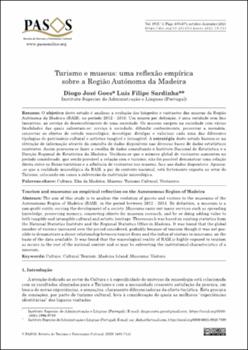Turismo e museus: uma reflexão empírica sobre a Região Autónoma da Madeira
Date
2021Abstract
O objetivo deste estudo é analisar a evolução dos hóspedes e visitantes dos museus da Região
Autónoma da Madeira (RAM), no período 2012 ‐ 2018. Um museu por definição, é uma entidade sem fins
lucrativos, ao serviço do desenvolvimento de uma sociedade. Os museus surgem na sociedade com várias
finalidades das quais salientam‐se: serviço à sociedade, difundir conhecimento, preservar a memória,
conservar os objetos de estudo museológico, investigar, divulgar e valorizar cada uma das diferentes
tipologias de património cultural e artístico tangível e intangível. A estratégia deste estudo baseou‐se na
obtenção de informação através da consulta de dados disponíveis nas diversas bases de dados estatísticos
existentes. Assim procurou‐se fazer a recolha de dados consultando o Instituto Nacional de Estatística e a
Direção Regional de Estatística da Madeira. Verificou‐se que o número global de visitantes aumentou no
período considerado, que sendo provável a relação com o turismo, não foi possível demonstrar uma relação
direta entre os fluxos turísticos e a afluência de visitantes nos museus, face aos dados disponíveis. Apurou‐
‐se que a realidade museológica da RAM, a par do contexto nacional, está fortemente exposta ao setor do
Turismo, colocando em causa a subversão da instituição museológica. The aim of this study is to analyze the evolution of guests and visitors to the museums of the
Autonomous Region of Madeira (RAM), in the period between 2012 ‐ 2018. By definition, a museum is a
non‐profit entity, serving the development of a society. Museums carry out many services such as spreading
knowledge, preserving memory, conserving objects for museum research, and by so doing adding value to
both tangible and intangible cultural and artistic heritage. Theresearch was based on existing statistics from
the National Statistics Institute and the Regional Statistics Office in Madeira. It was found that the global
number of visitors increased over the period considered, probably because of tourism though it was not pos‐
sible to demonstrate a direct relationship between tourist flows and the influx of visitors to museums, on the
basis of the data available. It was found that the museological reality of RAM,is highly exposed to tourism
as occurs in the rest of the national context and so may be subverting the institutional characteristics of a
museum.





